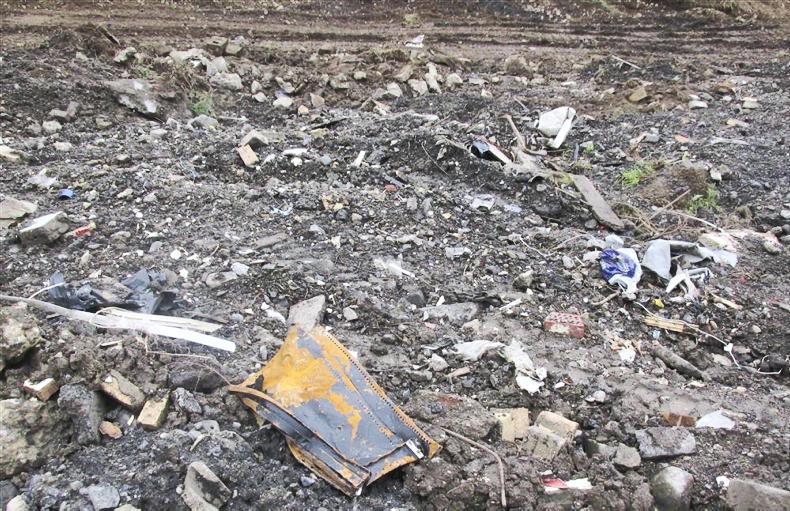Dublin’s rural hinterland is seeing an increase in the illegal dumping of construction waste, with farmers allowing the practice on their land facing prosecution.
“There seems to be a steady increase in illegal activity,” Meath county council senior engineer Caroline Corrigan told the Irish Farmers Journal, describing it as a “massive problem in Meath”.
While there were 10 convictions for such offences in the county in 2016 (nine landowners and one haulier), there have already been three in the first seven weeks of this year, with three other cases due in court next month and three more serious ones sent to the director of public prosecution.
Surveillance
Joe Boland, director of water and environment at Kildare county council, also reported a recent increase in construction waste dumping. “The council’s environmental enforcement team have been particularly engaged in this area in recent times and are actively collaborating with the gardaí. The use of CCTV and other surveillance is ongoing,” Boland said.
He and Corrigan noted the lack of facilities licensed to dispose of construction waste in the greater Dublin area, where some hit their 2016 annual quotas as early as last autumn. Instead of travelling to licensed sites further away, some builders have looked for easy dumping options on farms in neighbouring counties.
A spokesperson for the Environmental Protection Agency told the Irish Farmers Journal that accepting any waste without a license or permit was punishable by fines of up to €5,000 on summary conviction, or up to €15m on conviction on indictment.
“As well as posing a risk to their local environment (such as to soil, groundwater and surface water), landowners who accept waste without a waste permit may face both significant costs in cleaning up the waste and the risk of criminal prosecution,” the spokesperson added.
Corrigan said that, while the bulk of construction and demolition waste was usually clay, stone or concrete, it often includes plastic, metal and even organic waste, asbestos or tar that can pose a risk to livestock.
According to her, some farmers accept waste against typical payments of €10/load of clay or €20 to €30/load of construction and demolition waste.
Others may see it as a cheap way of obtaining materials for roadways or drainage works.
Corrigan said Meath county council would prefer to prosecute the primary originator of the waste, but found that farmers questioned about illegal dumping on their land sometimes refused to give that information.
“We are keen to work with farmers and landowners to prevent the unauthorised deposition of waste,” Corrigan said “We would favour a proactive approach as going down the legal route is time consuming and expensive for all parties involved.”
Read more
Naughten non-committal on national rollout of plan to combat illegal dumping
Diesel laundering ‘effectively eliminated’ – Revenue
Dublin’s rural hinterland is seeing an increase in the illegal dumping of construction waste, with farmers allowing the practice on their land facing prosecution.
“There seems to be a steady increase in illegal activity,” Meath county council senior engineer Caroline Corrigan told the Irish Farmers Journal, describing it as a “massive problem in Meath”.
While there were 10 convictions for such offences in the county in 2016 (nine landowners and one haulier), there have already been three in the first seven weeks of this year, with three other cases due in court next month and three more serious ones sent to the director of public prosecution.
Surveillance
Joe Boland, director of water and environment at Kildare county council, also reported a recent increase in construction waste dumping. “The council’s environmental enforcement team have been particularly engaged in this area in recent times and are actively collaborating with the gardaí. The use of CCTV and other surveillance is ongoing,” Boland said.
He and Corrigan noted the lack of facilities licensed to dispose of construction waste in the greater Dublin area, where some hit their 2016 annual quotas as early as last autumn. Instead of travelling to licensed sites further away, some builders have looked for easy dumping options on farms in neighbouring counties.
A spokesperson for the Environmental Protection Agency told the Irish Farmers Journal that accepting any waste without a license or permit was punishable by fines of up to €5,000 on summary conviction, or up to €15m on conviction on indictment.
“As well as posing a risk to their local environment (such as to soil, groundwater and surface water), landowners who accept waste without a waste permit may face both significant costs in cleaning up the waste and the risk of criminal prosecution,” the spokesperson added.
Corrigan said that, while the bulk of construction and demolition waste was usually clay, stone or concrete, it often includes plastic, metal and even organic waste, asbestos or tar that can pose a risk to livestock.
According to her, some farmers accept waste against typical payments of €10/load of clay or €20 to €30/load of construction and demolition waste.
Others may see it as a cheap way of obtaining materials for roadways or drainage works.
Corrigan said Meath county council would prefer to prosecute the primary originator of the waste, but found that farmers questioned about illegal dumping on their land sometimes refused to give that information.
“We are keen to work with farmers and landowners to prevent the unauthorised deposition of waste,” Corrigan said “We would favour a proactive approach as going down the legal route is time consuming and expensive for all parties involved.”
Read more
Naughten non-committal on national rollout of plan to combat illegal dumping
Diesel laundering ‘effectively eliminated’ – Revenue










SHARING OPTIONS